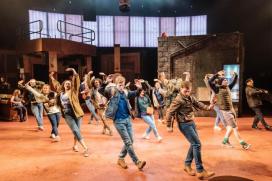30/05/18
Bravo, Sheila Hancock! Okay, so these words have probably been said countless times about this gloriously strong-willed actress – and likely in relation to more successful projects – but still, bravo! Because her physical accomplishment here is nothing short of astonishing.
The eponymous Edie (Hancock) is a widow, free at last from the tyranny of a long and unhappy marriage, but in the process of being coerced into a nursing home by her daughter, Nancy (Wendy Morgan). Nancy and Edie don’t exactly see eye to eye, and – in a fit of rebellion – Edie decides to fulfil her long-held dream of climbing Mount Suilven, a mountain in Scotland that she’s only ever seen in photographic form. But the mountain is a talisman, a reminder of the wild young girl she used to be, and of her father, the only person who encouraged – rather than curbed – her adventurous spirit.
Alighting from the train in Inverness, the enormity of her endeavour strikes Edie, as she discovers not only is there no bus to take her to the hotel she’s booked, but her hiking equipment is hopelessly ancient, unsuitable for the task ahead. Salvation comes in the unlikely form of Jonny (Kevin Guthrie), a local man who literally collides with her, and then offers her a lift. Initially hostile, they reach an uneasy truce as Edie realises he can help her to achieve her aim: Jonny – who needs the money – agrees to train her for her climb.
It’s a decent – if predictable – premise, and the performances are great. Hancock – who is eighty-bloody-five – actually climbs the mountain; there’s no green screen (or sedan chair) to augment this reality. The scenery is almost as breathtaking as the octogenarian’s fitness, and the two central characters are very well realised.
But there are some real issues here, although they’re kind of hard to pin down. There’s an odd stagnation about the film, so that it never really flies (it flutters occasionally and looks as though it might take off, but always falls back down to earth). Some moments are just peculiar, with people behaving or speaking in ways that don’t ring true, or appearing very briefly for no apparent reason (what’s the point of the German hiker, for example?). The dialogue is clumsy, the telling overwrought.
It’s a shame, because there’s clearly a good movie here, just fighting to get out. A lighter touch with the script might have made all the difference.
But still. Bravo, Sheila!
3 stars
Susan Singfield





























